

Relevance Logic. First published Wed Jun 17, 1998; substantive revision Mon Mar 26, 2012 Relevance logics are non-classical logics.
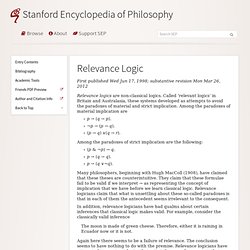
Called ‘relevant logics’ in Britain and Australasia, these systems developed as attempts to avoid the paradoxes of material and strict implication. Among the paradoxes of material implication are p → (q → p). ¬p → (p → q). Among the paradoxes of strict implication are the following: (p & ¬p) → q. p → (q → q). Intensional Logic. First published Thu Jul 6, 2006; substantive revision Thu Jan 27, 2011 There is an obvious difference between what a term designates and what it means.
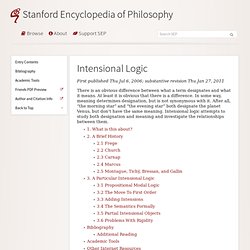
At least it is obvious that there is a difference. In some way, meaning determines designation, but is not synonymous with it. After all, “the morning star” and “the evening star” both designate the planet Venus, but don't have the same meaning. Intensional logic attempts to study both designation and meaning and investigate the relationships between them. 1. If you are not skilled in colloquial astronomy, and I tell you that the morning star is the evening star, I have given you information—your knowledge has changed. Second-order and Higher-order Logic. First published Thu Dec 20, 2007; substantive revision Wed Mar 4, 2009 Second-order logic is an extension of first-order logic where, in addition to quantifiers such as “for every object (in the universe of discourse),” one has quantifiers such as “for every property of objects (in the universe of discourse).”
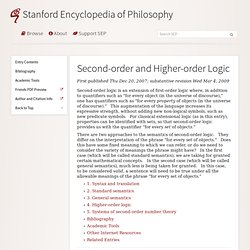
This augmentation of the language increases its expressive strength, without adding new non-logical symbols, such as new predicate symbols. For classical extensional logic (as in this entry), properties can be identified with sets, so that second-order logic provides us with the quantifier “for every set of objects.” There are two approaches to the semantics of second-order logic. They differ on the interpretation of the phrase “for every set of objects.” 1. In symbolic logic, the formula (Px → Px) will be true, no matter what object in the universe of discourse is assigned to the variable x. In first-order languages, there are some things we can say, and some that we cannot. 2.
Epistemic Logic. First published Wed Jan 4, 2006 Epistemic logic is the logic of knowledge and belief.
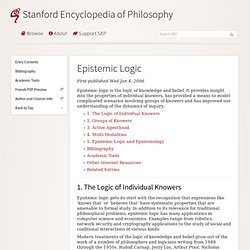
It provides insight into the properties of individual knowers, has provided a means to model complicated scenarios involving groups of knowers and has improved our understanding of the dynamics of inquiry. 1. Deontic Logic. First published Tue Feb 7, 2006; substantive revision Wed Apr 21, 2010 Deontic logic[1] is that branch of symbolic logic that has been the most concerned with the contribution that the following notions make to what follows from what: To be sure, some of these notions have received more attention in deontic logic than others.
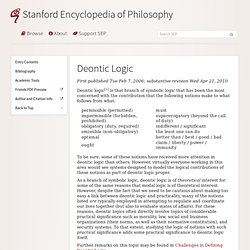
However, virtually everyone working in this area would see systems designed to model the logical contributions of these notions as part of deontic logic proper. As a branch of symbolic logic, deontic logic is of theoretical interest for some of the same reasons that modal logic is of theoretical interest. However, despite the fact that we need to be cautious about making too easy a link between deontic logic and practicality, many of the notions listed are typically employed in attempting to regulate and coordinate our lives together (but also to evaluate states of affairs).
I.stanford.edu/~ullman/focs/ch14.pdf. Introduction to Predicate Logic. Predicate Logic The propositional logic is not powerful enough to represent all types of assertions that are used in computer science and mathematics, or to express certain types of relationship between propositions such as equivalence.
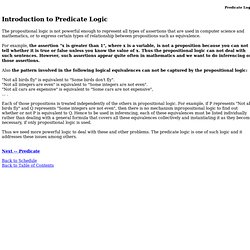
For example, the assertion "x is greater than 1", where x is a variable, is not a proposition because you can not tell whether it is true or false unless you know the value of x. Thus the propositional logic can not deal with such sentences. However, such assertions appear quite often in mathematics and we want to do inferencing on those assertions. Also the pattern involved in the following logical equivalences can not be captured by the propositional logic: Classical Logic. First published Sat Sep 16, 2000; substantive revision Wed Aug 28, 2013 Typically, a logic consists of a formal or informal language together with a deductive system and/or a model-theoretic semantics.
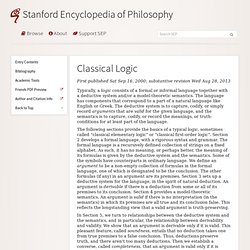
The language has components that correspond to a part of a natural language like English or Greek. The deductive system is to capture, codify, or simply record arguments that are valid for the given language, and the semantics is to capture, codify, or record the meanings, or truth-conditions for at least part of the language. Aristotle's Logic. 1.
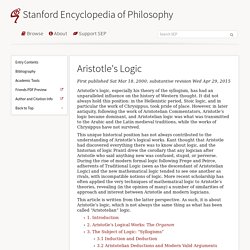
Introduction Aristotle’s logical works contain the earliest formal study of logic that we have. It is therefore all the more remarkable that together they comprise a highly developed logical theory, one that was able to command immense respect for many centuries: Kant, who was ten times more distant from Aristotle than we are from him, even held that nothing significant had been added to Aristotle’s views in the intervening two millennia. In the last century, Aristotle’s reputation as a logician has undergone two remarkable reversals.
Www.dblab.ntua.gr/~dwq/p14.pdf. Taxonomy for Logic and Philosophy of Mathematics. QualitativeReasoning. Modal Logic. 1.
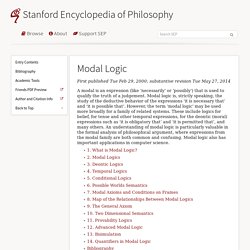
What is Modal Logic? Narrowly construed, modal logic studies reasoning that involves the use of the expressions ‘necessarily’ and ‘possibly’. However, the term ‘modal logic’ is used more broadly to cover a family of logics with similar rules and a variety of different symbols. A list describing the best known of these logics follows. 2. Ii.fmph.uniba.sk/~sefranek/kri/handbook/chapter16.pdf. Artificial Intelligence - foundations of computational agents. 14.1.1 Situation Calculus The idea behind situation calculus is that (reachable) states are definable in terms of the actions required to reach them.
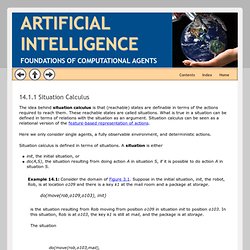
These reachable states are called situations. Papers/A Query Language Based on the Ambient Logic MSCS.A4.pdf. Papers/Ambient Logic.A4.pdf. Situation Calculus Representations. Next: Simple situation calculus Up: ELABORATION TOLERANCE Previous: Formalizing the Amarel Representation Situation Calculus Representations The term situation calculus is used for a variety of formalisms treating situations as objects, considering fluents that take values in situations, and events (including actions) that generate new situations from old. At present I do not know how to write a situation calculus formalization that tolerates all (or even most) of the elaborations of section 7 .
Nevertheless, I think it is useful to give some formulas that accomplish some elaborations and discuss some issues of elaboration tolerance that these formulas present. Subsections. Logic (idea) Introduction to Logic: People often incorrectly say things like "that's illogical", or "the only logical thing to do". Of course, as part of common parlance, we all know exactly what they mean, but in the world of logic, their statements are erroneous. For instance the man who supports Manchester United one week, then switches allegiance to Manchester City the next, is fickle, but he may not be illogical.
Before we look at how to use logic, we need to ask one important question: Informal Logic. First published Mon Nov 25, 1996; substantive revision Mon Nov 28, 2011 Informal logic is an attempt to develop a logic that can assess and analyze the arguments that occur in natural language (“everyday,” “ordinary language”) discourse. Discussions in the field may address instances of scientific, legal, and other technical forms of reasoning (and notions like the distinction between science and pseudo-science), but the overriding aim has been a comprehensive account of argument that can explain and evaluate the arguments found in discussion, debate and disagreement as they manifest themselves in daily life — in social and political commentary; in news reports and editorials in the mass media (in newspapers, magazines, television, the World Wide Web, twitter, etc.); in advertising and corporate and governmental communications; and in personal exchange.
Propositional Logic: inference rules. List of rules of inference. This is a list of rules of inference, logical laws that relate to mathematical formulae. Introduction[edit] Rules of inference are syntactical transform rules which one can use to infer a conclusion from a premise to create an argument. A set of rules can be used to infer any valid conclusion if it is complete, while never inferring an invalid conclusion, if it is sound. A sound and complete set of rules need not include every rule in the following list, as many of the rules are redundant, and can be proven with the other rules.
Discharge rules permit inference from a subderivation based on a temporary assumption. Indicates such a subderivation from the temporary assumption to Rules for classical sentential calculus[edit] Sentential calculus is also known as propositional calculus. Rules for negations[edit] Reductio ad absurdum (or Negation Introduction) Reductio ad absurdum (related to the law of excluded middle) Rule of inference. Typically, a rule of inference preserves truth, a semantic property. In many-valued logic, it preserves a general designation. But a rule of inference's action is purely syntactic, and does not need to preserve any semantic property: any function from sets of formulae to formulae counts as a rule of inference.
Usually only rules that are recursive are important; i.e. rules such that there is an effective procedure for determining whether any given formula is the conclusion of a given set of formulae according to the rule. Inference Rules of Natural Deduction. Example 1 . Prove that a contradiction implies any proposition B. Rules of Inference and Logic Proofs. Logic and Artificial Intelligence. First published Wed Aug 27, 2003; substantive revision Wed Oct 30, 2013 Artificial Intelligence (which I'll refer to hereafter by its nickname, “AI”) is the subfield of Computer Science devoted to developing programs that enable computers to display behavior that can (broadly) be characterized as intelligent.[1] Most research in AI is devoted to fairly narrow applications, such as planning or speech-to-speech translation in limited, well defined task domains. But substantial interest remains in the long-range goal of building generally intelligent, autonomous agents,[2] even if the goal of fully human-like intelligence is elusive and is seldom pursued explicitly and as such.
Throughout its relatively short history, AI has been heavily influenced by logical ideas. The relations between AI and philosophical logic are part of a larger story. It is hard to find a major philosophical theme that doesn't become entangled with issues having to do with reasoning.